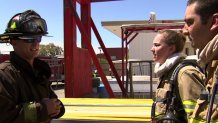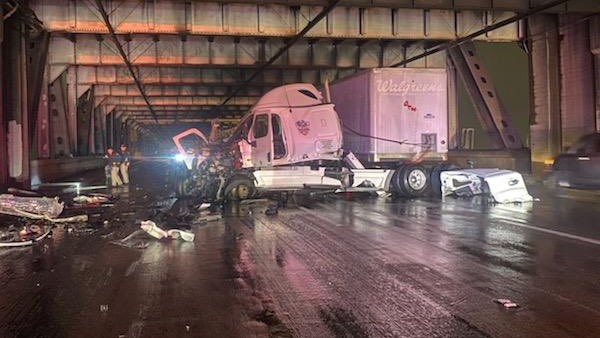The smoke and flames that killed 36 people at Oakland’s Ghost Ship warehouse were subdued by the time fire Lt. George Freelen began his shift that morning. But as the sun rose over the charred wreckage, the toughest work was yet to come.
“That’s when we had to recover the dead,” Freelen said. “The first dead. The victims that were on the surface.”
Freelen and his crew set to work pulling bodies from the rubble that used to be a live-work space for artists. The scale of the tragedy was unprecedented in Oakland’s history, but after 19 years on the job, Freelen had seen plenty of death before.
“[It’s] tragic to have to see these innocent victims and see them in the last moments of their life and zip them up in a body bag,” Freelen said.
It’s hard for Freelen to talk about what he saw that day, but he said they recovered nine bodies before returning to Station 13 just around the corner from the warehouse few had heard of before it burned to the ground.
Despite the horrific nature of the morning’s work, Freelen said he was managing to keep his emotions in check. The veteran firefighter had seen a lot over the years, and so far, never lost control.

But that would soon change as his crew continued to run calls into the night.
Local
“A young girl’s dad passed away in his sleep,” Freelen said. “The worst part of our job, delivering bad news; I had to deliver to that girl. She had to tell her family; she was the translator.”
A Punch to the Heart
Freelen said delivering the news to that young girl triggered something inside him that told him he wasn’t OK. It was like a punch to his heart, Freelen said, and in the days that followed, he had trouble sleeping. Other firefighters told him he wasn’t acting like himself. After “dropping an F-bomb” over the radio one day, Freelen did what many firefighters in previous generations were sometimes too proud to do: He asked for help.
The breaking point is different for every firefighter. Most are exposed to ongoing trauma over a 30-year career, and NBC Bay Area’s investigation found that stress is taking a toll.
NBC Bay Area developed a confidential online survey with help from California Professional Firefighters (CPF) and the International Association of Fire Fighters (IAFF) to hear directly from firefighters about the impact of post-traumatic stress on their lives and to learn what services are available when they need help.
CPF distributed the survey to local unions representing firefighters serving 25 large California cities, including 20 in the Bay Area.
Firefighters Respond
More than 700 firefighters from at least 13 different departments responded, overwhelmingly saying stressful or traumatic experiences on the job have impacted their mental health. They say stigma continues to be a substantial barrier to seeking help.
Post-traumatic stress disorder, long associated with veterans returning from combat, is just now becoming a priority in the fire service. Many in the field say mental health services available to first responders are years behind what’s offered to combat veterans. Just look at the suicide numbers for firefighters, they say, which have outpaced line of duty deaths in each of the past two years, according to data from the Firefighter Behavioral Health Alliance.
“We bring a young man or woman into the fire academy, and we put them on the street as a firefighter, and for 30 years, we expose them to the worst of the human condition,” said Long Beach fire Chief Mike DuRee, who serves as president of the California Fire Chiefs Association. “Tragic accidents, family tragedies, car crashes – the myriad of things firefighters respond to. We as an organization, the fire service organization, haven’t done enough to admit that it’s real.”
Of the 550 firefighters who said stress on the job caused lingering or unresolved emotional issues, 70 percent said they had trouble sleeping, 64 percent said they were easily angered or withdrawn, 31 percent developed substance abuse issues, and 14 percent had thoughts of suicide. The majority of respondents don’t believe there are adequate behavioral health services available to firefighters.
Freelen looks at post-traumatic stress as an injury, not a permanent disorder. An injury, he said, can heal if treated properly.
“I have to do the work, but I can heal from it, do my job, finish my career and serve the citizens like I do every day,” Freelen said.
Improving Services
Awareness of post-traumatic stress in the fire service is without a doubt on the rise. But that doesn’t always translate to concrete behavioral health services for firefighters that need help.
NBC Bay Area sent a second survey to fire department administrators in 25 California cities, mostly in the Bay Area, asking about the mental health services available to the rank and file. Although they all have at least one program in place, NBC Bay Area’s investigation found some are further along than others.
Half of those departments, for instance, don’t have a standard operating procedure or guidelines in place that outline mental and behavioral health services in the department. More than a third of them don’t offer behavioral health awareness training in their fire academies.
“The expectation of my community is that those firefighters are going to show up and do their job in a world class way the way they always do,” DuRee said. “If they can’t do that because they are dealing with behavioral health issues, I feel like I not only failed the firefighters, but I failed my community.”
The California Fire Chiefs Association is now partnering with California Professional Firefighters (CPF) on the labor side to address mental health services for firefighters and change the “suck it up” culture that’s persisted in firehouses for decades.
In February, DuRee co-wrote a letter with CPF president Lou Paulson committing to working together on mental and behavioral health issues. The letter announced the formation of the California Fire Service Task Force on Behavioral Health, now charged with developing a strategy and plowing ahead on these issues.
Peer support and mental health training for current and new generations of firefighters are the cornerstones of that effort.
“Most importantly, we believe the most important step we all must take together is to end the stigma by normalizing the issue of behavioral health,” the letter states. “No matter how tough, none of us is immune from the anguish that can build from a career of difficult calls. As we’ve seen all too frequently of late, silence can be fatal.”
Most cities have an Employee Assistance Program, which generally constitutes a network of therapists to assist struggling public employees on a variety of issues. It’s the resource Freelen used when he needed help, and after a few initial bumps in the road, he says the program has really helped him.
But those programs aren’t tailored specifically to firefighters, and half of those who responded to NBC Bay Area’s survey did not find the program helpful.
Now, CPF and its local partners are pushing for a peer support model, where firefighters are trained to recognize signs of stress in their colleagues and step in when needed. They say that ongoing support is more important than the department-mandated debriefs, known as “critical incident stress management”, that are typically only triggered by major incidents such as the Ghost Ship fire.
Capt. Chris Foley is leading those efforts in Oakland.
“There is no middle ground right now, and that’s something we would like to see established,” Foley said.
Foley says cities need to be funding additional mental health services for firefighters, but he also recognizes the need to stamp out the fire service culture that’s historically frowned on asking for help.
“We’re an industry steeped in tradition,” Foley said. “We hold near and dear traditions that probably aren’t great for us.”
After decades of bearing the unwanted memories of his toughest calls, Freelen said he’s living proof firefighters can begin healing from their invisible wounds.
“I think we’re an industry, when given the resources, will use them to help us be better firefighters,” Freelen said. “I’m hoping this will make me a better firefighter down the road.”
Angeline Bernabe contributed to this story. Have a story you want the NBC Bay Area Investigative Unit to look into? Email or call 888-996-TIPS. Like Liz on Facebook and follow her on Twitter. Follow Investigative Producer Michael Bott on Twitter here.



